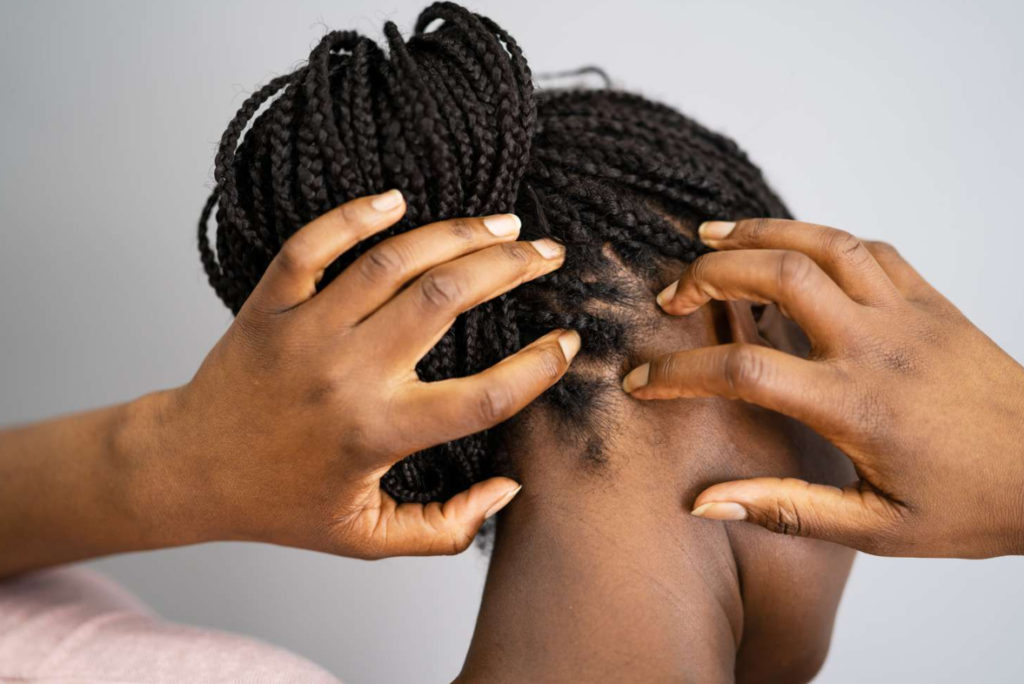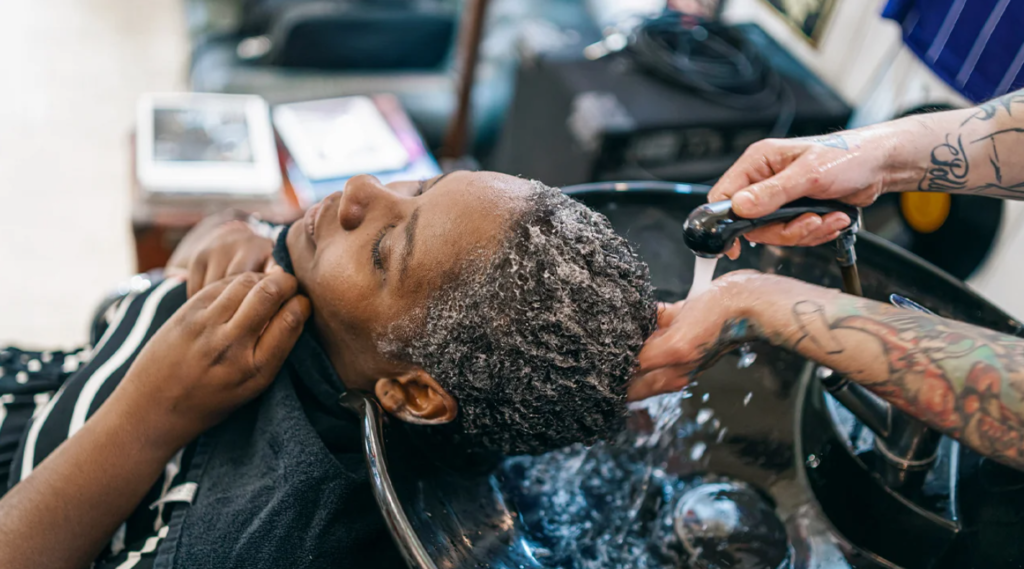Introduction to Eczema and Its Impact on Black and Brown Women
Eczema, a common skin condition known for causing dry, itchy skin, disproportionately affects black and brown women, presenting unique challenges. This article delves into the nature of eczema, focusing on its impact on women of color, particularly those suffering from severe itchy scalp. Understanding eczema’s fundamentals and prevalence is crucial in recognizing its effect on this demographic.
Understanding Eczema: Basics and Prevalence
Eczema, or atopic dermatitis, is a chronic skin condition characterized by red, itchy, and inflamed skin. It varies in severity, ranging from mild dryness to intense itching that disrupts daily life. The prevalence of eczema is notable worldwide, affecting a significant portion of the population, with a higher incidence noted in women, especially those of African and Hispanic descent.
Unique Challenges for Black and Brown Women
Black and brown women face specific challenges when dealing with eczema. The condition often manifests differently on darker skin tones, making diagnosis and treatment more complex. Additionally, cultural hair care practices and products can exacerbate scalp eczema, necessitating a tailored approach to management.
Identifying Eczema on the Scalp: Symptoms and Diagnosis
Understanding the symptoms and getting a proper diagnosis are the first steps in managing scalp eczema effectively.

Common Symptoms of Scalp Eczema in Women of Color
Scalp eczema in black and brown women typically presents as severe itching, redness, and flaking. These symptoms can be exacerbated by certain hairstyles and products, leading to increased discomfort and distress.
Diagnostic Approaches for Scalp Eczema
Diagnosing scalp eczema involves a thorough examination by a dermatologist. The process may include reviewing the patient’s medical history, examining the scalp, and possibly conducting skin tests to rule out other conditions.
Exploring the Causes of Eczema in Black and Brown Women
Eczema’s causes are multifaceted, involving genetic and environmental factors. Understanding these can help in devising effective management strategies.
Genetic and Environmental Factors
Eczema is often linked to a family history of the condition or other atopic diseases like asthma and hay fever. Environmental factors, such as allergens, stress, and climate, also play a significant role in the development and exacerbation of eczema.
The Role of Hair Care Practices
Hair care practices common among black and brown women, like tight braiding or use of certain oils and products, can irritate the scalp and worsen eczema symptoms. Awareness of these triggers is essential in managing the condition.
Comparing Eczema in Different Skin Tones
Eczema’s presentation and impact can vary based on skin tone, making it essential to understand these differences for effective treatment.
The Impact of Melanin on Eczema Symptoms
Melanin-rich skin, while offering some protection against sun damage, can mask or alter the appearance of eczema, leading to delayed or misdiagnosis. Inflammation and itching might be more intense, and post-inflammatory hyperpigmentation is a common concern.
Differences in Eczema Presentation
On darker skin tones, eczema might appear as darker brown, purple, or ashy gray patches, differing from the red or pink patches commonly seen on lighter skin. This variation necessitates a tailored approach to both diagnosis and treatment.
Effective Treatment Strategies for Scalp Eczema
Finding relief from scalp eczema involves a combination of medical treatments and natural remedies, each offering different benefits.
Medical Treatments and Their Efficacy
Medical treatments for scalp eczema include topical corticosteroids, calcineurin inhibitors, and antihistamines. These medications can reduce inflammation and itching, providing significant relief.
Home Remedies and Natural Solutions
Natural remedies, like coconut oil or tea tree oil, can moisturize the scalp and reduce itching. However, it’s essential to use these cautiously, as some natural products can irritate sensitive skin.
The Importance of a Tailored Skincare Routine
Developing a personalized skincare routine is crucial for managing scalp eczema effectively.
Developing a Personalized Eczema Care Plan
Each individual’s experience with eczema is unique, necessitating a personalized care plan. This plan should consider the person’s skin type, severity of symptoms, and lifestyle.
Essential Skincare Products for Eczema-Prone Scalp
Selecting the right skincare products is vital. Products should be hypoallergenic, non-irritating, and free from harsh chemicals. Moisturizing regularly with suitable products can significantly alleviate symptoms.
Nutritional Aspects in Managing Scalp Eczema
Diet plays a crucial role in managing eczema. Certain foods can trigger or worsen symptoms, while others can help reduce inflammation and improve skin health.
Dietary Considerations for Eczema Relief
A diet rich in anti-inflammatory foods like omega-3 fatty acids, fruits, and vegetables can be beneficial. Conversely, it’s advisable to avoid foods that might trigger flare-ups, such as dairy, gluten, or processed foods.
Vitamins and Supplements Beneficial for Skin Health
Certain vitamins and supplements, like vitamin D, omega-3 fatty acids, and probiotics, can improve skin health and reduce eczema symptoms. Consultation with a healthcare provider is recommended before starting any supplements.
Hair Care Tips for Women with Scalp Eczema
Proper hair care is essential for women with scalp eczema, as certain practices and products can exacerbate the condition.
Safe Hair Care Practices
Gentle hair care practices are crucial for managing scalp eczema. This includes avoiding tight hairstyles, using gentle shampoos, and minimizing the use of heat styling tools.
Recommended Products for Sensitive Scalp
Choosing the right hair care products is essential. Products should be free from irritants like sulfates, parabens, and fragrances. Look for products specifically formulated for sensitive scalp or eczema-prone skin.
RELATED ARTICLE : 13 TOP WINTER HAIR CARE TIPS FOR HEALTHY LOCKS
Psychological Effects of Eczema on Women of Color
Eczema can have significant emotional and psychological impacts, particularly for women of color.
Coping with the Emotional Impact of Eczema
Living with eczema can be challenging, affecting self-esteem and mental health. Seeking support, whether through therapy, support groups, or community forums, can be beneficial.
RELATED : ANTI-AGING SERUM: 6 MOST EFFECTIVE INGREDIENTS
Building a Supportive Community
Connecting with others who understand the challenges of living with eczema can provide emotional support and practical advice. Online forums and local support groups can be excellent resources.
Eczema and Its Relation to Hair Loss
Understanding the connection between eczema and hair loss is essential for preventing and managing this potential complication.
Understanding the Connection
Severe scalp eczema can lead to hair loss due to the constant scratching and inflammation. This makes effective management of the condition even more crucial.
Preventing and Managing Hair Loss Due to Eczema
To prevent hair loss, it’s important to manage scalp eczema effectively through appropriate treatments and hair care practices. Consulting with a dermatologist can provide guidance on minimizing hair loss.
Finding Eczema Relief for Black and Brown Women with Severe Itchy Scalp
This section focuses on comprehensive approaches to finding relief from severe itchy scalp due to eczema, specifically for black and brown women.
Comprehensive Approaches to Relief
A combination of medical treatment, natural remedies, dietary changes, and tailored hair care can provide comprehensive relief from scalp eczema.
Personal Stories of Managing Eczema
Sharing personal experiences and success stories can inspire and guide others dealing with similar challenges. These stories highlight the effectiveness of various treatments and coping strategies.
The Role of Dermatologists in Eczema Care
Seeking professional help from a dermatologist is crucial in effectively managing scalp eczema.
Seeking Professional Help
A dermatologist can provide a correct diagnosis, recommend effective treatments, and offer guidance on managing the condition long-term.
What to Expect from Dermatological Treatments
Dermatological treatments may include prescription medications, light therapy, or other advanced treatments. Knowing what to expect can help patients make informed decisions about their care.
Innovations in Eczema Treatment and Research
The field of eczema treatment and research is continually evolving, offering new hope for those affected.
Latest Advances in Eczema Care
Recent advances in eczema treatment include new medications, improved diagnostic techniques, and a better understanding of the condition’s underlying causes.
Future Prospects for Eczema Treatment
Ongoing research promises more effective and personalized treatments in the future, improving the lives of those with eczema.
Eczema Support Groups and Resources
Accessing support groups and resources can be invaluable for individuals dealing with scalp eczema.
Finding Community Support
Support groups, both online and in-person, offer a platform for sharing experiences, tips, and emotional support.
Helpful Online and Offline Resources
Numerous resources, including websites, books, and local organizations, provide valuable information and support for managing eczema.
Preventative Measures to Avoid Eczema Flare-Ups
Preventing eczema flare-ups involves understanding and avoiding triggers, along with making lifestyle changes.
Lifestyle Changes for Eczema Prevention
Lifestyle changes, such as stress management, regular moisturizing, and avoiding known irritants, can help prevent eczema flare-ups.
Understanding and Avoiding Triggers
Identifying and avoiding personal eczema triggers is essential for long-term management. This may involve making changes to diet, skincare routine, or environment.
Testimonials and Success Stories
Sharing testimonials and success stories from women who have successfully managed their scalp eczema can be inspiring and informative.
Real-life Experiences of Women Overcoming Scalp Eczema
These stories provide insight into the challenges and triumphs of managing scalp eczema, offering hope and practical advice.
Inspiring Stories of Resilience
These narratives highlight the resilience and determination of individuals who have navigated the complexities of eczema, providing motivation and encouragement to others.
Frequently Asked Questions
How does scalp eczema differ in black and brown women compared to other ethnicities? Scalp eczema in black and brown women may present differently due to variations in skin and hair properties. These women often experience more intense itching and may have more pronounced symptoms due to differences in hair care practices and the structure of the scalp and hair. Moreover, eczema can appear as darker patches on their skin, which requires a nuanced approach to diagnosis and treatment.
What are the most effective treatments for scalp eczema in women of color? Effective treatments for scalp eczema in women of color include a combination of topical corticosteroids, gentle skincare products, and natural remedies like coconut oil or aloe vera. It’s also crucial to use hair care products formulated for sensitive skin. In some cases, phototherapy or systemic treatments may be recommended by dermatologists.
Can dietary changes help in managing scalp eczema? Yes, dietary changes can play a significant role in managing scalp eczema. Incorporating anti-inflammatory foods like omega-3 fatty acids, fresh fruits, and vegetables, and reducing the intake of potential triggers like dairy and processed foods can help alleviate symptoms.
What should be considered when choosing hair care products for scalp eczema? When choosing hair care products for scalp eczema, look for products free from harsh chemicals, fragrances, and irritants. Opt for gentle, moisturizing formulas designed for sensitive skin. It’s also important to avoid products that can dry out the scalp, like those containing alcohol or sulfates.
How can psychological and emotional impacts of scalp eczema be managed? Managing the psychological and emotional impacts of scalp eczema involves seeking support, whether through counseling, joining support groups, or connecting with others who share similar experiences. Building a positive self-image and focusing on self-care can also be beneficial.
What role do dermatologists play in treating scalp eczema in black and brown women? Dermatologists play a crucial role in diagnosing and treating scalp eczema in black and brown women. They can provide personalized treatment plans, recommend suitable skincare and hair care products, and offer advice on lifestyle changes to manage the condition effectively.
Conclusion and Encouragement for Ongoing Eczema Management
In conclusion, finding relief from severe itchy scalp due to eczema in black and brown women requires a multifaceted approach, including medical treatment, proper skincare, and hair care, as well as lifestyle and dietary modifications. It’s essential to work closely with healthcare providers and dermatologists to develop a tailored plan that addresses individual needs and concerns. Remember, with the right approach and support, managing scalp eczema is achievable, and it’s possible to lead a comfortable and confident life.





